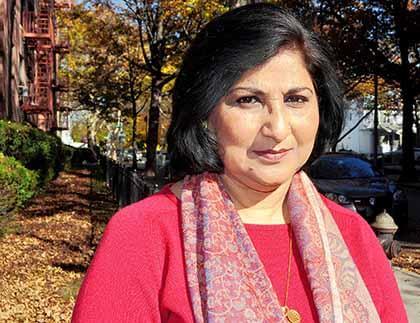By Joe Anuta
A social worker just won $5,000 for her Queens-based charity, but you probably won’t see the impact.
That’s because Robina Niaz fights an often-invisible injustice that is perpetrated behind closed doors: domestic abuse.
The money was to be awarded to Niaz by Bank of America in a ceremony this week as part of the bank’s annual Neighborhood Excellence Initiative.
“Domestic violence cuts across all barriers of education, class, sexual orientation and ethnicity,” Niaz said.
It is a widespread problem, but she is not offering a widespread solution.
Niaz’s organization, which does such sensitive work that its location is not public, is called Turning Point for Women and Families. It offers several programs: teaching women how to flee an abusive relationship, offering counseling sessions, encouraging English language and career-building classes and hosting several youth programs.
But the programs are designed only for Muslim women, many who have recently immigrated to the country.
“For immigrant women, the problem becomes even more complicated than for indigenous victims of abuse,” she said, adding that abuse victims often do not speak the language, are not familiar with laws protecting against spousal abuse and lack the strong support structures they enjoyed from their extended families back home. To make matters worse, after Sept. 11, many Muslims have been targets of bigotry.
“The women are very isolated and lose their sense of self-esteem,” said Niaz, who asked that her neighborhood not be identified.
But why not help everyone?
First, Niaz does not have the staff. Second, addressing domestic violence is not like giving out bowls of soup.
Abuse victims are often too ashamed or afraid to discuss their problem. And if they decide to talk at all, it is usually to someone they feel comfortable with — in this case, other Muslim women.
“The trust factor is very important,” Niaz said.
And Niaz and her colleagues have a unique advantage. They can approach women inside mosques and around the neighborhoods to reach out and spread the word about their services without embarrassing women or arousing suspicion from men. They can also identify with the cultural differences between America and Muslim countries and, most importantly, they can speak the languages.
“The Muslim community might be the most diverse in the world,” Niaz said.
Niaz and her staff speak a total of seven languages, but that is still not enough. The organization can deal with Muslims who speak Arabic or Urdu, but would have trouble communicating with women from Turkey or Indonesia, for example.
“One day I hope we will have more languages,” she said.
But for now, Niaz’s seven-language service is nothing to sneeze at. She has transformed the lives of more than 400 women who thought they had no one to turn to.
“One woman didn’t know a word of English,” Niaz said. “I still remember the day when she came in, and how desperate and lonely she was. We had to convince her that it was okay to talk about [domestic abuse]. But then she started taking language classes and volunteering. She began to speak English to me in the office and now she’s had several jobs.”
Niaz founded the organization in 2004 after ending a troubled marriage and getting laid off from her job. She had the option of returning to her native country — Pakistan — but decided to stay instead.
“Leaving was the easy way out,” Niaz said. “I put myself in the shoes of all the immigrant women who didn’t have the education or family support that I did, and I realized that this was something I had to do.”
Six years later, the organization has grown only slightly from its humble beginnings as a one-woman operation, and now includes two other staff members and lots of volunteers.
The prize money is part of what Niaz hopes is a growing trend in collaboration between big businesses and grassroots organizations.
“Corporations have the material resources that we don’t have,” Niaz said. “I think it’s crucial that they recognize the social work that is having an impact on the lives of New Yorkers,” she said.
Reach reporter Joe Anuta by phone at 718-260-4566.



































